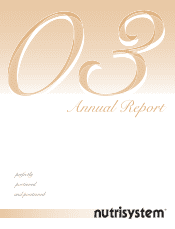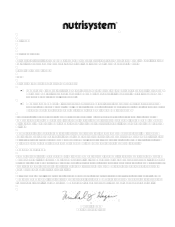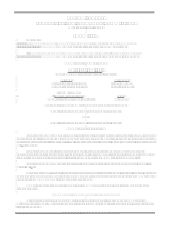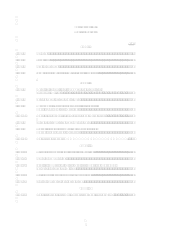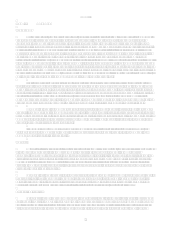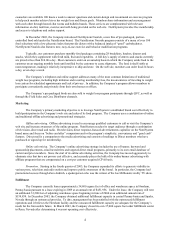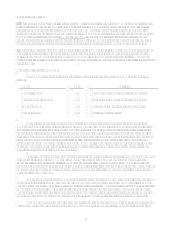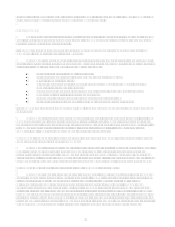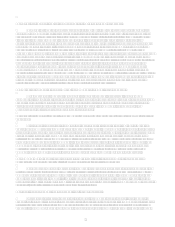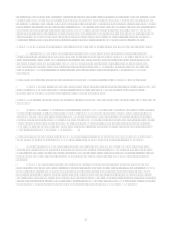Nutrisystem 2003 Annual Report Download - page 11
Download and view the complete annual report
Please find page 11 of the 2003 Nutrisystem annual report below. You can navigate through the pages in the report by either clicking on the pages listed below, or by using the keyword search tool below to find specific information within the annual report. 9
liability claims could have a material adverse effect on the business. Distributors of weight loss food products, vitamins,
nutritional supplements and minerals, including the Predecessor Businesses, have been named as defendants in product
liability lawsuits from time to time. The successful assertion or settlement of an uninsured claim, a significant number of
insured claims or a claim exceeding the limits of the Companys insurance coverage would harm it by adding costs to the
business and by diverting the attention of senior management from the operation of the business. The Company may
also be subject to claims that its products contain contaminants, are improperly labeled, include inadequate instructions
as to use or inadequate warnings covering interactions with other substances. Product liability litigation, even if not
meritorious, is very expensive and could also entail adverse publicity for the Company and reduce its revenues.
The Company may be subject to claims that its personnel are unqualified to provide proper weight loss advice.
Most of the Companys counselors for our diet program do not have extensive training or certification in
nutrition, diet or health fields and have only undergone the training they receive from the Company. NutriSystem may
be subject to claims from its members alleging that its personnel do not have the qualifications necessary to provide
proper advice regarding weight loss. The Company may also be subject to claims that its personnel have provided
inappropriate advice or have inappropriately referred or failed to refer members for matters other than weight loss.
Although the Company carries relevant liability insurance, such claims could result in damage to the Companys
reputation.
NutriSystem has a history of operating losses and an accumulated deficit and it may become unprofitable.
The Company and its Predecessor Businesses have incurred losses in four of the last six years. As of December
31, 2003, the Company had an accumulated deficit of $22 million. The Company needs to continue to generate
significant revenues to maintain profitability, and it may not be able to do so.
The Companys stock price has been volatile and its trading volume has been low. These conditions may continue
or worsen.
The Companys common stock was delisted from the NASDAQ National Market on May 25, 2001, and before
and since it has, at times, traded at very low volumes. The Company cannot predict when a more consistently liquid
trading market may develop. In addition, the Companys share price may decline for reasons related, or unrelated, to
future operating results. For example, in October 2000, the Companys share price declined substantially for reasons it
believes are unrelated to operating performance. There are many factors, including the risk factors described in this
Annual Report on Form 10-K, that may cause operating results to fluctuate or have a significant adverse effect on the
market price of the Companys common stock.
Certain anti-takeover provisions in the Companys certificate of incorporation and Delaware law may deter or
prevent a change in control of the Company, even if that change would be beneficial to its stockholders.
Provisions of the Companys certificate of incorporation, bylaws and Delaware law may have the effect of
deterring unsolicited takeovers or delaying or preventing changes in control of the Company, including transactions in
which its stockholders might otherwise receive a premium for their shares over then current market prices. In addition,
these provisions may limit the ability of stockholders to approve transactions that they may deem to be in their best
interests.
The Companys certificate of incorporation permits its Board of Directors to issue preferred stock without
stockholder approval upon such terms as its Board of Directors may determine. The rights of the holders of its common
stock will be junior to, and may be adversely affected by, the rights of the holders of any preferred stock that may be
issued in the future. The issuance of preferred stock, while providing desirable flexibility in connection with possible
acquisitions and other corporate purposes, could have the effect of making it more difficult for a third party to acquire, or
of discouraging a third party from acquiring, a majority of the Companys outstanding common stock. The issuance of a
substantial number of preferred shares could adversely affect the price of the Companys common stock.

